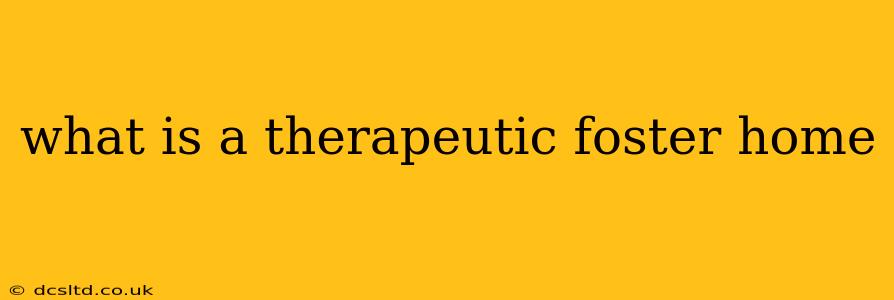What is a Therapeutic Foster Home?
A therapeutic foster home provides a nurturing and structured environment for children and youth with complex emotional, behavioral, and mental health needs. Unlike traditional foster care, these homes offer specialized care and support tailored to the individual needs of each child. They go beyond basic care, providing intensive therapeutic interventions designed to help children heal from trauma, develop coping mechanisms, and improve their overall well-being.
This specialized care distinguishes them from standard foster care, which primarily focuses on providing a safe and stable living environment. Therapeutic foster homes actively work towards positive behavioral change and improved emotional regulation.
What are the key differences between a therapeutic foster home and a traditional foster home?
This is a common question, and the differences are significant:
-
Level of Support: Traditional foster homes offer a loving home and basic care. Therapeutic foster homes provide significantly more support, including regular therapeutic interventions, case management, and access to specialized services like therapy, counseling, and medication management.
-
Child's Needs: Traditional foster homes typically care for children who don't require intensive therapeutic interventions. Therapeutic foster homes specifically focus on children and youth who've experienced trauma, have behavioral challenges, or struggle with mental health issues such as anxiety, depression, or PTSD.
-
Staff Training & Qualifications: Therapeutic foster parents receive extensive training and ongoing support to equip them to handle the unique needs of children with complex trauma and behavioral challenges. This training often includes specialized certifications and ongoing professional development. Traditional foster parents receive training, but the focus and intensity differ.
What kind of children live in therapeutic foster homes?
Children placed in therapeutic foster homes often exhibit a range of challenges, including:
- Trauma: They may have experienced abuse, neglect, or significant loss.
- Behavioral Issues: These might include aggression, self-harm, defiance, or difficulty following rules.
- Mental Health Conditions: They may have diagnoses such as anxiety, depression, PTSD, ADHD, or Oppositional Defiant Disorder (ODD).
- Attachment Disorders: These can lead to difficulties forming healthy relationships.
The specific needs of each child are carefully assessed, and the therapeutic foster home is chosen to match those needs with the provider's expertise and resources.
What services are offered in therapeutic foster homes?
The services offered vary depending on the specific home and the child's needs, but typically include:
- Individual and group therapy: Addressing emotional and behavioral issues.
- Medication management: Overseeing and administering prescribed medications.
- Educational support: Helping children succeed in school.
- Case management: Coordinating various services and support systems.
- Family therapy: Reuniting children with their biological families when appropriate and safe.
- Skill-building programs: Teaching children coping mechanisms and life skills.
- Recreational and social activities: Fostering positive relationships and healthy leisure time.
How are therapeutic foster homes different from residential treatment centers?
While both settings provide intensive care, they differ significantly in their environment and approach. Residential treatment centers are generally larger facilities with more structured and regimented settings. Therapeutic foster homes strive to create a more home-like, family-oriented environment. The goal in therapeutic foster homes is often reunification with biological family or transition to independent living, while residential treatment centers sometimes provide longer-term care.
Therapeutic foster homes play a vital role in providing high-quality, individualized care for children with complex needs, offering a path toward healing and a brighter future. They emphasize a family-based approach within a supportive and structured environment, aiming to equip these children with the skills and resilience they need to thrive.
